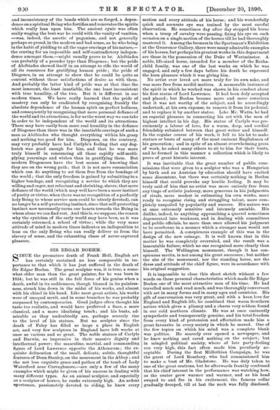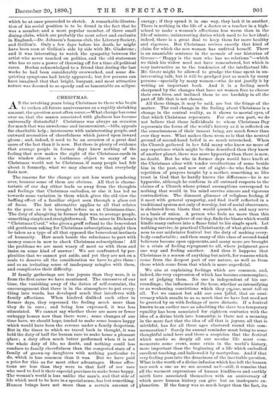SIR EDGAR BOEHM.
SINCE the premature death of Frank Holl, English art has certainly sustained no loss comparable in im- portance to that which it has just suffered in the death of Sir Edgar Boehm. The great sculptor was, it is true, a some- -what older man than the great painter, for he was born in 1834; but he was still in the full force of his genius when a death, awful in its suddenness, though blessed in its painless- ness, struck him down in the midst of his works, and almost with his chisel in hia hand. Like most great artists, his works were of unequal merit, and in some branches he was probably surpassed by contemporaries. Good judges often thought his -taste too realistic, and would have preferred a finer, a more -classical, and a more idealising touch ; and his busts, ad- mirable as they undoubtedly are, perhaps scarcely rise to the level of his statues. But no sculptor since the death of Foley has filled so large a place in English art, and very few sculptors in England have left works at -once so various and so great. The noble statues of Carlyle -and Darwin, so impressive in their massive dignity and -intellectual power; the masculine, martial, and commanding figure of Lord Lawrence opposite the Athenaeum ; the ex- quisite delineation of the small, delicate, subtle, thoughtful features of Dean Stanley, on the monument in the Abbey ; and the not less exquisite grace and pathos of the tomb of Lady Waterford near Curraghmore,—are only a few of the many examples which might be given of his success in dealing with many different types. As an animal sculptor, and especially as a sculptor of horses, he ranks extremely high. An ardent Sportsman, passionately devoted to riding, he knew every motion and every attitude of his horse; and his wonderfully quick and accurate eye was trained by the most careful observation. He sometimes day after day stopped his horse when a troop of cavalry were passing, fixing his eye on each occasion on a single motion of the horses till he had thoroughly mastered it. Among the bronzes in the Sportsman's Exhibition at the Grosvenor Gallery, there were many admirable examples of his horses, but perhaps his greatest works in this department are those in the possession of the Duke of Westminster. A noble, life-sized horse, intended for a member of the Roths- child family, was one of the last works on which he was engaged, and only a few days before his death he expressed the keen pleasure which it was giving him.
No artist ever loved art more truly for its own sake, and was more free from sordid motives. A memorable instance of the spirit in which he worked was shown in his conduct about his first statue of Lord Lawrence. It had been duly accepted and placed ; but Boehm became more and more conscious that it was not worthy of the subject, and he accordingly undertook, at his own expense, to remove it from its pedestal, and to replace it by another statue. Like Mr. Watts, he had an especial pleasure in connecting his art with the men of highest intellect in his day. His statue of Carlyle was pre- eminently a labour of love, for a warm, deep, and cordial friendship subsisted between that great writer and himself. In the regular course of his work, it fell to his lot to make statues or busts of many of the most eminent Englishmen of his generation ; and in spite of an almost overwhelming press of work, he asked many others to sit to him for their busts, and he formed in this manner a collection which is likely to prove of great historic interest.
It was inevitable that the great number of public com- missions that were given to a sculptor who was a Hungarian by birth and an Austrian by education should have excited some discontent, but there was certainly nothing in Boehm himself that could provoke any hostile feeling. It may be truly said of him that no artist was more entirely free from any tinge of artistic jealousy, more generous in his judgments of rivals, more modest in estimating his own works, more ready to recognise rising and struggling talent, more com- pletely unspoiled by popularity and success. His nature was at once extremely sensitive and intensely amiable. His dislike, indeed, to anything approaching a quarrel sometimes degenerated into weakness, and in dealing with committees and public officials, he more than once allowed his judgment to be overborne in a manner which a stronger man would not have permitted. A conspicuous example of this was in the design of the new coinage. It is well known that in this matter he was completely overruled, and the result was a lamentable failure, which no one recognised more clearly than himself. The Wellington monument, though it has con- spicuous merits, is not among his great successes ; but neither the site of the monument, nor the standing horse, nor the dress and attitude of the chief figure, were in accordance with his original suggestion.
It is impossible to close this short sketch without a few words on those personal characteristics which made Sir Edgar Boehm one of the most attractive men of his time. He had travelled much and read much, and was thoroughly conversant with art in many forms and in many ages and countries. His gift of conversation was very great, and with a keen love for England and English life, he combined that warm Southern nature which gives a pliancy and a charm very seldom found in our cold northern climate. He was at once eminently sympathetic and transparently genuine, and his total freedom from every kind of pretension and affectation made him a great favourite in every society in which he moved. One of the few topics on which his mind was a complete blank was politics. He scarcely ever opened a newspaper, and he knew nothing and cared nothing on the subject; but in mingled political society, where of late party-feeling ran very high, this fact often made him peculiarly ac- ceptable. During the first Midlothian Campaign, be was the guest of Lord Rosebery, who had commissioned him to make a bust of Mr. Gladstone. He was duly taken to one of the great orations, but he afterwards frankly confessed that his chief interest in the performance was watching how, as the orator grew warmer and warmer, and as his head swayed to and fro in his excitement, the famous collar gradually drooped, till at last the neck was fully disclosed, which he at once proceeded to sketch. A remarkable illustra- tion of his social position is to be found in the fact that he was a member, and a most popular member, of three small dining-clubs, which are probably the most select and exclusive in England,—Dr. Johnson's famous club, the Literary Society, and Grillon's. Only a few days before his death, he might have been seen at Grillon's side by side with Mr. Gladstone ; and it was interesting to watch the sympathy between the artist who never touched on politics, and the old statesman who has so rare a power of throwing of for a time all political cares. Boehm acknowledged to a friend that during the last weeks he had been considerably overworked, and some dis- quieting symptoms had lately appeared ; but few persons can have imagined that that bright, buoyant, and most attractive nature was doomed to so speedy and so lamentable an eclipse.











































 Previous page
Previous page